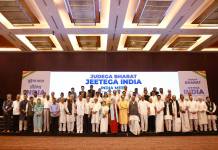Apoorv Pathak
@apoorva2pathak
Away from the spotlight, Suresh Prabhu is silently but steadfastly going about the onerous task of reforming hitherto moribund Indian Railways.
While there are pitfalls he must be cautious of, all indications point to reviving the mammoth railway can be Modi’s legacy, like highways was Vajpayee’s.
Suresh Prabhu stepped into the corridors of Rail Bhavan with a reputation for performance having been architect of power reforms in the Vajapayee government. But even those who are aware of Prabhu’s past doubted his ability to change much in the famously inertial railways.
Prabhu’s predecessors, realising how deep the rot in Indian Railways runs, opted to rather use railways as a tool for political patronage. But over a year after taking charge, Prabhu has restored hope that Indian Railways could be revived. He has managed to do this by combining efficiency, sincerity, with a non-confrontational approach that has helped him avoid being derailed by resistance from lobbies.
The story of silent transformation of Indian Railways deserves to be narrated in an environment where we too often succumb to cynical belief that things can never change.
Below are some of the areas in which Prabhu is transforming Indian Railways:
Ramping up investment
The railway network in India is hopelessly clogged due to years of low investment in increasing and improving the network. The effect is that we have slow speed, less supply and more demand of seats and large number of accidents. When the Britishers left India we had a rail network of approximately 55,000 kms and China had 27,000 kms, which is half of what we had. Today, after nearly 70 years of independence, our network is only 65,000 kms while that of China is 1.2 lakh kms. How China speeded up ahead of India is best illustrated in how it built its rail infrastructure and India didn’t.
Thankfully, things are now changing. Prabhu has tapped commercial prospects for more revenue, secured loans from commercial sources, managed with support from Narendra Modi to increase the gross budgetary allocation towards railways and raised more revenue from higher fares. All this extra money he is investing in infrastructure.
Prabhu is also wisely concentrating on completing the already announced projects than announcing projects which will never be finished.
Another prudent step on this front is prioritising certain key projects which are acting as bottlenecks, like the Mughal Sarai-Allahabad section.
Restoring Fiscal Health
At the heart of railways’ trouble was its fiscal weakness. Until now ministers preferred that consumers did not pay and get no, or poor, service than pay and get good service. So we had abysmally low fares where cost of providing service was greater than what was charged for them.
Prabhu is a welcome departure. He has boldly moved towards a system where fares reflect cost. He is in the process of constituting a rail fare authority which will have experts who will decide what should be the fare and if government decided to have lower fares it will subsidise transparently from its resources. This will ensure railway will have more than Rs 20,000 crore extra per annum to invest in improving its services.
Another reform on financial front has been to clean up railways’ finance sheets and make it more credible. This is necessary for getting loans and inviting investors.
The railways have also started saving big time on power purchases by replacing lopsided contracts where state discoms overcharged railways with power from its own sources or power sourced at competitive rates.
Social media for better responsiveness and motivating performers:
Under Prabhu, Indian Railways which was notorious for apathy towards travellers concerns has dramatically improved its responsiveness. “A good meal served cold is useless.” Something similar is the case with poor travel experience in railways. Most of us have at some point or other been victim of corruption, lack of cleanliness and other such apathy from railway staff. Quality of service is intricately related with how responsive the service provider is to the concerns of the consumer.
In railways’ case, apathy was the word to describe its responsiveness. But this is changing; surely, if slowly. This near impossible task has been managed by Prabhu by being proactive on social media, where all important officials — GM’s and DRM’s have been ordered to open account where passengers are asked to report their concern to concerned officer and also tag the ministry. This ensures that the officials act fast as they are aware that the ministry is keeping a watch.
Just the other day, a lady facing harassment in train contacted Prabhu and his officials on social media and within no time the administration responded to her and ensured her security. Isn’t this such a cheap yet effective way to improve on a vital front? I hope other arms of Indian state too can imitate this progressive step.
Prabhu also regularly shares the good work done by his officers, especially in the area of cleanliness. This boosts the morale of those who are performing and motivates other to perform well.
Decentralised decision making
The railway minister before Prabhu revelled in handing out contracts as it was a meaty source for party funds and also enhanced the influence of the minister. Of course, it leads to delays in award of contracts, contracts not being awarded on merit, and ministers not having enough time or energy for their main job of deciding on policies.
Prabhu has done away with this archaic practise which bogged down projects. He has decentralised decision making even while ensuring he keeps strict vigil on if the power is being exercised with integrity. A case in point in how in an unprecedented measure Kota DRM (quite high ranking in railway bureaucracy) was shunted out on a complaint of a minor irregularity.
So, now decisions are being made faster, with lesser political pressure and by people who are more competent and have more information about them.
Speeding up strategically important projects
Prabhu and Modi have committed to connect all north east states by the railway. They also have concentrated on finishing the missing link in Kashmir railways. This will improve our capacity to defend our borders, make these places better integrated with the mainland bringing economic windfall to these places, and can lay foundation for a more integrated South Asia.
But even as one is hopeful of impending turnaround in Indian Railways, there are important pitfalls that Prabhu must be cautious of and avoid to realise his mission. Two of them have been discussed below.
Debt trap
As railway projects are capital intensive projects with low return on capital and high gestation period, it is imprudent to finance them through commercial borrowing. This can lead railway to a debt trap where significant portion of their revenue goes in servicing the debt, leaving railways financial situation precarious. So, Prabhu should instead try to get more budgetary support to finance these projects.
Resistance by bureaucracy
Railway’s bureaucracy is oversized, with rampant departmentalism where each department is busy preserving its powers than working towards a common goal. Prabhu must make railways a more professional competitive organisation with the right size and cohesiveness.
Conclusion
If Suresh Prabhu is able to address these challenges and continue along the reform path, history will gloriously note him as the man who made possible a Phoenix-like rise of the railways, again. Few of us can even begin to imagine the tremendous gains that can occur if railways is fixed. Our manufacturing competiveness can increase with cheaper and faster transport, India can be a more interconnected nation, carbon imprint of our travel can reduce significantly, our travel can be comfortable and hassle free and our jobs creation and growth can be much higher. So, Prabhu is a man India must watch out for. Can he make the railways reforms Modi’s legacy like highway construction is Vajpayee’s? Only time will tell.
















